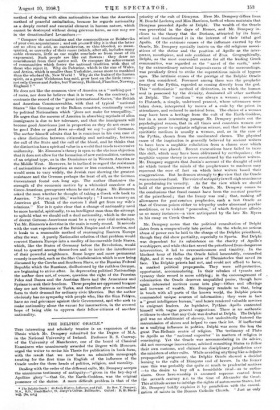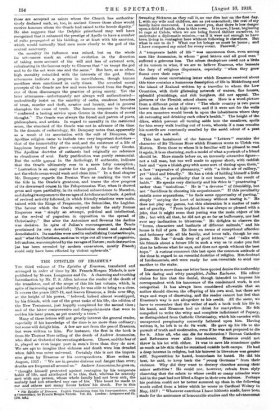THE DELPHIC ORACLE.* This interesting and scholarly treatise is an
expansion of the Thesis which Mr. Dempsey submitted for the Degree of M.A. in the National University of Ireland. Professor R. S. Conway. of the University of Manchester, one of the board of Classical Examiners who unanimously awarded the Degree with Honours, urged the writer to revise his Thesis for publication in book form, with the result that we now have an admirable monograph treating for the first time in English of the influence of the Oracle under the three heads of politics, religion, and morality.
Dealing with the order of the different cults, Mr. Dempsey accepts the unanimous testimony of antiquity—" given in the hey-day of Apolline glory "—that Ge, the Earth-Goddess, was the original possessor of the shrine. A more difficult problem is that of the
• The Ddphie Oracle : its Early History, I nfluenee, and Fall. By Rev. T. Dempsey,
D.D., Head-Master, St. Joseph's College. Ballinagoe, Oxford H. Black.
act.1 priority of the cult of Dionysus. Here Mr. Dempsey differs from M. Boucle!) Leclercq and Mies Harrison, both of whom maintain that
Dionysus preceded Apollo at Delphi. The wealth of the Oracle was proverbial in the days of Homer, and Mr. Dempsey in- clines to the theory that the Dorians, attracted by its fame, seized and transformed it in the interest of their tribal god Apollo. Of the extrinsic causes of the influence exerted by the Oracle, Mr. Dempsey specially insists on the old religious associ- ations of the shrine and the position of Apollo as the inter- preter, mouthpiece, and sole confidant of Zeus. Geographically, Delphi, as the most convenient centre for all the leading Greek communities, was regarded as the "navel of the earth," and, by the extraordinary natural impressiveness of the surroundings, was peculiarly fitted to strike the superstitious minds of bygone ages. The intrinsic causes of the prestige of the Delphic Oracle are then considered. Foremost among these was the prophetic frenzy of the Pythia, regarded as coming directly from the god. This " enthusiastic " method of divination, in which the human soul is possessed by the divinity, dominated all other methods at Delphi. The " medium " was always a woman ; according to Plutarch, a simple, unlettered peasant, whose utterances were taken down, interpreted by means of a code by the priest in attendance, and reduced to metrical form. The choice of a woman may have been a heritage from the cult of the Earth-Goddess, but ia a most interesting passage Mr. Dempsey points out the psychological reason, that in all times and countries women are especially prone to orgiastic religious seizure, and that the modern soiritistic medium is usually a woman, and, as in the case of the Pythia, chosen from the uneducated classes. The physical cause of the inspiration is generally believed by ancient writers to have been a mephitic exhalation from a chasm over which the tripod was placed. Recent excavations have failed to trace this cleft, which may have been obliterated by earthquakes ; the mephitic vapour theory is never mentioned by the earliest writers. Mr. Dempsey suggests that Justin's account of the draught of cold air which turned the minds of the prophetesses to madness may represent the core of fact on which later writers based their exaggerations. But he demurs strongly to 'he view that the Oracle was a conscious fraud. The voice of antiquity is well-nigh unanimous in proclaiming its veracity. As for the view which we should hold of the genuineness of the Oracle, Mr. Dempsey comes to the conclusions that fraud cannot have been the constant practice of the priesthood ; that the frenzy was real ; that, making all allowances for post-eventunt prophecies, such a test Oracle as that of Croesus points either to telepathy under abnormal psychic conditions, or to violent "possession,' of which Scripture affords us so many instances—a view anticipated by the late Mr. Myers in his essay on Greek Oracles.
Mr. Dempsey notes that the political consultation of Delphi dates from a comparatively late period. On the whole, no serious abuse of power can be laid to the charge of the Delphic priesthood, though they did show partiality, especially to Sparta. But Delphi was dependent for its subsistence on the charity of Apollo's worshippers, and while this fact saved the priesthood from dangerous intervention, it led to overcautiousness and timidity. In the blackest hour of Hellas the Oracle failed lamentably, counselled flight, and it was only the genius of Themistocles that saved it face. The Delphic priests had not, and could not afford to have, a marked political propaganda. They were self-protective, opportunist, accommodating. In their rebukes of tyrants and tyranny their record is more edifying ; in the encouragement of colonization the Oracle deeerves unqualified praise, though here again interested motives came into play—tithes and offerings and increase of wealth. Mr. Dempsey reminds us that, being in touch with all parts of the known world, the Delphio priests commanded unique sources of information ; they were in fact a " great intelligence bureau," and hence rendered valuable services to emigrant leaders. As legislator, Pythian Apollo contented himself with vague general suggestions. There is no authentic evidence to show that Any Code was drafted at Delphi. The Delphic god was no abolitionist of slavery, but undoubtedly fostered the manumission of slaves and helped to ease their lot. If ineffectual as a unifying influence in politics, Delphi was none the less the great Pan.Hellenic centre of religion. The testimony of Plato to Apollo as the "national expositor" in matters of religion is convineing. Yet the Oracle was accommodating in its advice, did not encourage innovations, advised consulting States to follow their own customs, and claimed no disciplinary jurisdiction over the ministers of other cults. While avoiding anything like a (let:Unite propagandist programme, the Delphic Oracle showed a decided leaning to the cults of Dionysus and of heroes. In the former ease this was probably due quite as much to prudential motives —to the desire to buy off a formidable rival—as to enthu- siasm. Over hero-worship it assumed supreme control from the seventh century so. to the time of Alexander the Great. This attitude seems to infringe the rights of autonomous States, but Mr. Dempsey boldly explains it by parallelism with the canoni- zation of saints in the Roman Catholic Church. "Just as only
those are accepted as saints whom the Church has authorita- tively declared such, so, too, in ancient Greece those alone would receive honours whom the Oracle had raised to the heroic dignity.' He also suggests that the Delphic priesthood may well have recognized that it enhanced the prestige of Apollo to have a number of cults propagated at his bidding, or at least with his sanction, which would naturally bind men more closely to the god of the central sanctuary.
On morality its influence was mixed, but on the whole its utterances mark an ethical evolution in the direction of taking more account of the will and less of external acts, culminating in the famous reply to Glances that" to tempt the god and to do the act were one and the same." But here, as so often, high morality coincided with the interests of the god. Other utterances indicate a progress in mercifulness, though human sacrifices were sanctioned in early times. The recorded moral precepts of the Oracle are few and were borrowed from the Sages ; one of them discourages the practice of going surety. Yet the later utterances—unfortunately not always well authenticated— undoubtedly insist on the sanctity of oaths, condemn breaches of trust, murder and theft, avarice and luxury, and in general champion the cause of truth. The famous response to Socrates "conferred a lasting service upon Greece in the domain of moral thought." The Oracle was always the friend and patron of poets, philosophers, and artists. In regard to morality in the restricted sense, the standard of the Oracle was not in advance of its time. In the domain of eschatology, Mr. Dempsey notes that, apparently as a result of its association with the cult of Dionysus, the Apolline religion came to include two very important doctrines— that of the immortality of the soul, and the existence of a life of happiness beyond the grave—unregarded by the early Greeks. The Apollins doctrine of catharsis had originally no reference So cleanliness of soul. Early purification was purely ceremonial. But the noble xvocrisoi in the Anthology, if authentic, indicate that the Oracle ultimately rose to a more lofty conception " Lustration is an easy matter for the good. As for the wicked, not the whole ocean would wash and clean him." In a final chapter Mr. Dempsey regards the Persian Wars as marking the turn of the tide in the Oracle's greatness, and traces the slow progress of its downward oourse in the Peloponnesian War, when it showed gross and open partiality, in its enforced subservience to Macedon, and during its exposure to the ravages of Aetolians and Gauls. A period of revived activity followed, in which friendly relations were main. tamed with the Kings of Pergamum, the Seleucidae, the Lagidae. The favour whioh the Oracle enjoyed under the early Roman Emperors was "simply an attempt, political and intellectual, at the revival of paganism in opposition to the spread of Christianity." But after the Antonines and Reveries the decline was decisive. In spite of Julian's encouragement, the Oracle proolaimed its own downfall ; Theodosius closed and Arocadius demolished it. Its marbles were used in embellishing Constantinople, and" what the Christians, acixious to wipe out all traces of paganism, left undone, was completed by the ravages of Nature; such destruction [as has been revealed by modern excavators, mostly French] could only have been effected by violent upheavals."



































 Previous page
Previous page